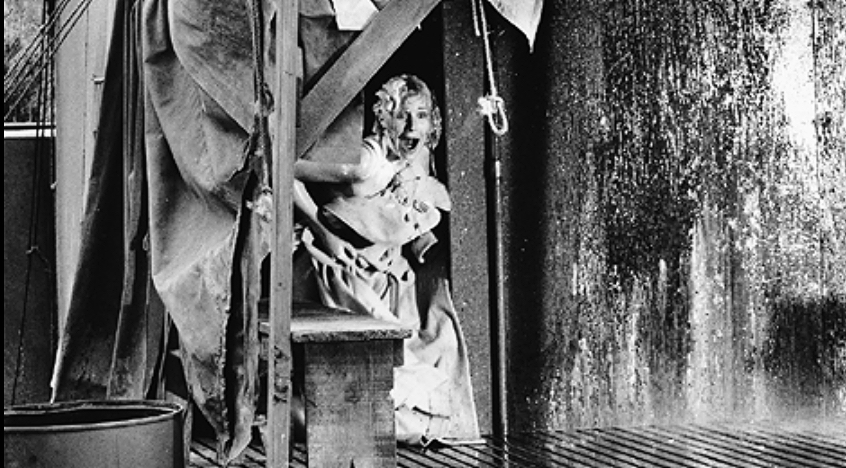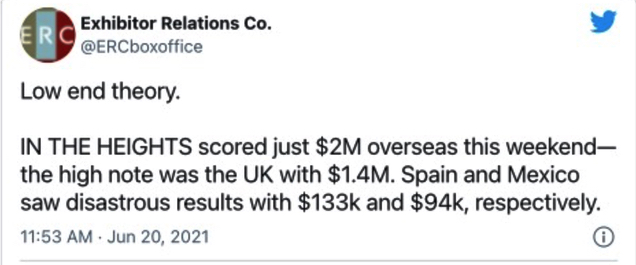Eric Adams, a tough pol who packs heat like Bill Duke in The Limey or Gary Cooper in High Noon or Sidney Poitier in In The Heat of the Night or Glenn Ford in The Big Heat, will apparently be the next Mayor of New York City.

It’s been two and a half months since Brendan Fraser, 52, finished his work on Darren Aronofsky‘s The Whale. Fraser was presumably asked to bulk up as he was playing a 600-pound depressive.
If I were Fraser I would have begun crash-dieting like a motherfucker as soon the film wrapped in order to look reasonably proportioned when the film opens. I would also fly to Prague and get my hair fixed. All right, I’ll admit it — I’m posting this because I was distracted by the term “glorious fat phoenix.”
Note to jackals and wokesters: I’m not using this term to express any personal thoughts about corpulence. I simply saw the item on Twitter. If you want to cancel anyone, cancel Lance St. Laurent — I’m just an innocent bystander.

I’ve watched three episodes of Hacks, the HBO Max relationship comedy series about a Las Vegas-based, boomer-aged standup comic named Deborah Vance (Jean Smart) who’s been told that her career will be in trouble if she doesn’t punch up her act, and so she reluctantly hires a 25-year-old, down-on-her-luck comedy writer named Hannah Ainbinder (Ava Daniels) in hopes of doing so.
Right away I was hooked and pleased by the sharp dialogue (the writers are Lucia Aniello, Paul W. Downs and Jen Statsky) and the fact that when Vance and Ainbinder start trading barbs (it doesn’t take long) Hacks is genuinely funny, or at least chuckle-worthy. And that was very welcome.
I was afraid, you see, that Hacks might play like Late Night, the 2019 Amazon comedy that used the same basic set-up — a crusty, boomer-aged talk-show host named Katherine Newbury (Emma Thompson) whose ratings have been sinking, and thereby pressured into hiring a young comedy writer named Molly Patel (Mindy Kaling), but mainly because she’s a woman of color.
Hacks is at least occasionally funny; Late Night, which bombed with the public after being embraced by the Sundance cool kidz, didn’t make me crack a smile. And for a good reason: Kaling’s Molly didn’t talk, think or behave like a comedy writer.
All good writers wield swords. They think in terms of cutting, mostly unkind observations about whatever. We all understand that jokes which “land” and actually make people laugh are always zingy and sometimes flirt with cruelty. A certain pointed irreverence is essential.
Molly’s bottom line was that she seemed to value being respected and treated courteously by Katherine and her comedy-writer colleagues above everything else, and that she’d rather swallow her tongue than wound the feelings of her fellow writers (all white guys) or anyone else for that matter. She was basically a p.c. Miss Manners type — more woke than joke.
Ainbinder is no stranger to wokester sensibilities (it comes with being in your mid 20s) but she’s not afraid to slice and dice when angered or otherwise aroused, and right away I was saying “okay, she’s a writer…she gets barbed humor…wounded and recognizable…the shoe fits.”
That’s all I’m saying for now — Hacks works because it’s funny, and because there’s no trouble believing that the two main characters are actual people. Everyone gets wounded or punctured or side-swiped in this series. Life is pain.
The opening of Quentin Tarantino‘s Jackie Brown is a tracking shot of the titular character (Pam Grier) on a moving treadmill inside LAX. Right away you’re noticing how stiff she is — no noticable reaction to her surroundings. Grier’s almost entirely frozen features (she blinks three or four times but otherwise doesn’t move a muscle) suggest the soul of a mannequin.
Right away everyone noticed a close resemblance to the famous opening-credit tracking shot from Mike Nichols‘ The Graduate — a view of Dustin Hoffman‘s Benjamin Braddock on a similar LAX treadmill. Every so often the immobile Hoffman reacts to this or that — the overhead lighting, a person walking nearby, a p.a. announcement — but mostly he just stands there like a robot. The idea was to suggest that Braddock was anxious and intimidated and fearful — afraid to move one way or the other.
In short, there was a point to be derived from Hoffman’s treadmill behavior. But what was the point of Grier doing it? I could never figure that out.
Jackie Brown is not a submerged or intimidated type — she’s a reasonably crafty, mentally alert, alive-on-the-planet-earth flight attendant (Cabo Airlines) who’s just arrived from some destination (presumably Cabo San Lucas). A follow-up shot shows her running to a gate in what appears to be the same terminal, where she’s expected to check people in for a flight. She makes it in time and performs her duties.
The first time I saw Jackie Brown I was immediately muttering “what the hell is this? Why is Grier doing a Dustin Hoffman? What’s the connection?” I still don’t know.
M*A*S*H (’70) is easily the coolest, funniest and most financially successful Robert Altman film ever made, not to mention the inspiration for a hugely successful TV series that ran for 11 years. I therefore found it surprising, at first, that out of 20 Altman films The Guardian‘s Ryan Gilbey had ranked M*A*S*H in 19th place. My actual reactions were “how…why…what the fuck?”
Then it hit me: Gilbey is on the youngish side, presumably born in the early to mid ’80s, and probably receptive to this or that wokester concern. (Three years ago Gilbey wrote that “it is difficult to see how the unquestioning reverence of directors can continue in this new climate of hyperawareness, where the constant drip-feed of discrediting stories proves once and for all that time’s up” — i.e., fuck Polanski, Allen and Bertolucci.) This led to a suspicion that Gilbey had probably downgraded M*A*S*H because of the cruel and abrasive way that Sally Kellerman’s uptight “Hot Lips Houlihan” is treated by M*A*S*H‘s Elliott Gould, Donald Sutherland, Tom Skerrit and the rest of the gang.
In short, this celebrated 1970 film has apparently fallen afoul of the #MeToo brigade and its allies.
I’m presuming that the outdoor shower humiliation sequence is regarded as particularly egregious. But the basic idea behind giving “Hot Lips” a hard time (along with her uptight boyfriend, Major Frank Burns, played by Robert Duvall) is that she’s an officious prig and “a regular Amy clown,” as Sutherland calls her in one scene.
“Hot Lips” (her actual name is Margaret) isn’t humiliated because she’s a woman or because Gould, Sutherland and the rest enjoy humiliating their betters or anything in that vein — she’s punished for being a rigid bureaucratic asshole — an officer more concerned with protocol and appearances than with behaving like a human being and somehow weathering the horrors of war, bloodshed and daily death. She walks around with a high regard for military tradition, and with a broomstick up her butt.



Roger Ebert, 51 years ago: “If the surgeons didn’t have to face the daily list of maimed and mutilated bodies, none of the rest of their lives would make any sense. When they are matter-of-factly cruel to ‘Hot Lips’ Hoolihan, we cannot quite separate that from the matter-of-fact way they’ve got to put wounded bodies back together again. ‘Hot Lips,’ who is all Army professionalism and objectivity, is less human because the suffering doesn’t reach her.”
In her 1.24.70 New Yorker review, Pauline Kael described “Hot Lips” as “a pompous fool.”
Kael also called M*A*S*H “the best American war comedy since sound came in, and the sanest American movie of recent years.” Pretty much everyone was in agreement back then.
M*A*S*H was set in 1951 Korea but was obviously played by actors rooted in the late ’60s. Gould and Sutherland’s hairstyles alone would never be tolerated in any 20th Century American military culture, and one of the first overheard lines (spoken by a M*A*S*H nurse) is that something-or-other is “a real drag.”
The mood of M*A*S*H was a revelation and a soother, and 1970 audiences fell head-over-heels. These irreverent surgeons were “hip Galahads,” as Kael put it, and “always on the side of decency and sanity.” Did they behave in a somewhat sexist manner, according to the standards of 2021? Yeah, but they weren’t jerks or dumb hounds — what mattered to them was getting through the Korean War their own way, and sometimes that included having it off with a willing nurse or downing of one or two martinis with fresh olives. Being smart fellows, they were simply accustomed to outsmarting the fools.
Ryan Gilbey is obviously not obliged to agree with Ebert, Kael and the multitudes who went wild over M*A*S*H back in the day, and he’s perfectly entitled to dismiss it because of behavior that doesn’t seem to pass muster by #MeToo standards. But posting this opinion makes him seem a little stiff-necked.
Most of Pauline Kael’s review:
“M*A*S*H is a marvellously unstable comedy — a tough, funny, and sophisticated burlesque of military attitudes that is at the same time a tale of chivalry. It’s a sick joke, but it’s also generous and romantic – an erratic episodic film, full of the pleasures of the unexpected. I think it’s the closest an American movie has come to the kind of constantly surprising mixture in Shoot the Piano Player, though M*A*S*H moves so fast that it’s over before you have time to think of comparisons. While it’s going on, you’re busy listening to some of the best overlapping comic dialogue ever recorded. The picture has so much spirit that you keep laughing – and without discomfort, because all the targets” — including “Hoi Lips” — “should be laughed at.


Friendo chimes in….
